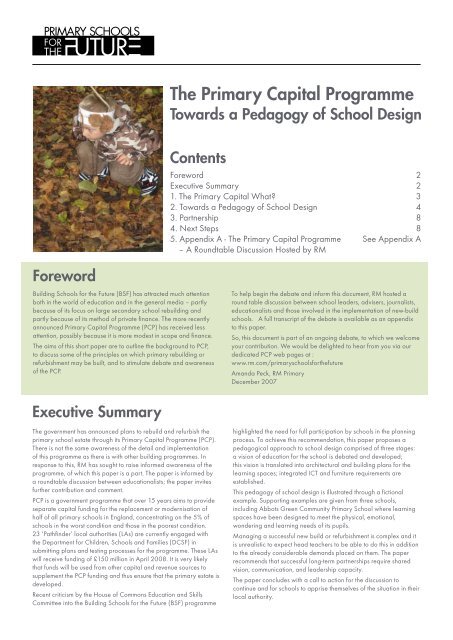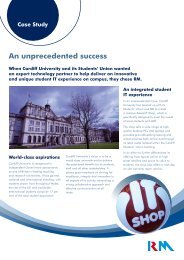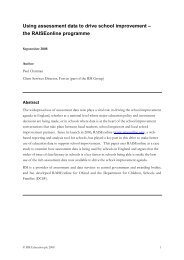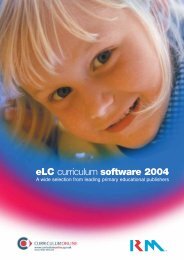The Primary Capital Programme - RM.com
The Primary Capital Programme - RM.com
The Primary Capital Programme - RM.com
Create successful ePaper yourself
Turn your PDF publications into a flip-book with our unique Google optimized e-Paper software.
<strong>The</strong> <strong>Primary</strong> <strong>Capital</strong> <strong>Programme</strong><br />
Towards a Pedagogy of School Design<br />
Contents<br />
Foreword<br />
Executive Summary<br />
1. <strong>The</strong> <strong>Primary</strong> <strong>Capital</strong> What?<br />
2. Towards a Pedagogy of School Design<br />
3. Partnership<br />
4. Next Steps<br />
5. Appendix A - <strong>The</strong> <strong>Primary</strong> <strong>Capital</strong> <strong>Programme</strong><br />
– A Roundtable Discussion Hosted by <strong>RM</strong><br />
2<br />
2<br />
3<br />
4<br />
8<br />
8<br />
See Appendix A<br />
Foreword<br />
Building Schools for the Future (BSF) has attracted much attention<br />
both in the world of education and in the general media – partly<br />
because of its focus on large secondary school rebuilding and<br />
partly because of its method of private finance. <strong>The</strong> more recently<br />
announced <strong>Primary</strong> <strong>Capital</strong> <strong>Programme</strong> (PCP) has received less<br />
attention, possibly because it is more modest in scope and finance.<br />
<strong>The</strong> aims of this short paper are to outline the background to PCP,<br />
to discuss some of the principles on which primary rebuilding or<br />
refurbishment may be built, and to stimulate debate and awareness<br />
of the PCP.<br />
To help begin the debate and inform this document, <strong>RM</strong> hosted a<br />
round table discussion between school leaders, advisers, journalists,<br />
educationalists and those involved in the implementation of new-build<br />
schools. A full transcript of the debate is available as an appendix<br />
to this paper.<br />
So, this document is part of an ongoing debate, to which we wel<strong>com</strong>e<br />
your contribution. We would be delighted to hear from you via our<br />
dedicated PCP web pages at :<br />
www.rm.<strong>com</strong>/primaryschoolsforthefuture<br />
Amanda Peck, <strong>RM</strong> <strong>Primary</strong><br />
December 2007<br />
Executive Summary<br />
<strong>The</strong> government has announced plans to rebuild and refurbish the<br />
primary school estate through its <strong>Primary</strong> <strong>Capital</strong> <strong>Programme</strong> (PCP).<br />
<strong>The</strong>re is not the same awareness of the detail and implementation<br />
of this programme as there is with other building programmes. In<br />
response to this, <strong>RM</strong> has sought to raise informed awareness of the<br />
programme, of which this paper is a part. <strong>The</strong> paper is informed by<br />
a roundtable discussion between educationalists; the paper invites<br />
further contribution and <strong>com</strong>ment.<br />
PCP is a government programme that over 15 years aims to provide<br />
separate capital funding for the replacement or modernisation of<br />
half of all primary schools in England, concentrating on the 5% of<br />
schools in the worst condition and those in the poorest condition.<br />
23 ‘Pathfinder’ local authorities (LAs) are currently engaged with<br />
the Department for Children, Schools and Families (DCSF) in<br />
submitting plans and testing processes for the programme. <strong>The</strong>se LAs<br />
will receive funding of £150 million in April 2008. It is very likely<br />
that funds will be used from other capital and revenue sources to<br />
supplement the PCP funding and thus ensure that the primary estate is<br />
developed.<br />
Recent criticism by the House of Commons Education and Skills<br />
Committee into the Building Schools for the Future (BSF) programme<br />
highlighted the need for full participation by schools in the planning<br />
process. To achieve this re<strong>com</strong>mendation, this paper proposes a<br />
pedagogical approach to school design <strong>com</strong>prised of three stages:<br />
a vision of education for the school is debated and developed;<br />
this vision is translated into architectural and building plans for the<br />
learning spaces; integrated ICT and furniture requirements are<br />
established.<br />
This pedagogy of school design is illustrated through a fictional<br />
example. Supporting examples are given from three schools,<br />
including Abbots Green Community <strong>Primary</strong> School where learning<br />
spaces have been designed to meet the physical, emotional,<br />
wondering and learning needs of its pupils.<br />
Managing a successful new build or refurbishment is <strong>com</strong>plex and it<br />
is unrealistic to expect head teachers to be able to do this in addition<br />
to the already considerable demands placed on them. <strong>The</strong> paper<br />
re<strong>com</strong>mends that successful long-term partnerships require shared<br />
vision, <strong>com</strong>munication, and leadership capacity.<br />
<strong>The</strong> paper concludes with a call to action for the discussion to<br />
continue and for schools to apprise themselves of the situation in their<br />
local authority.
















